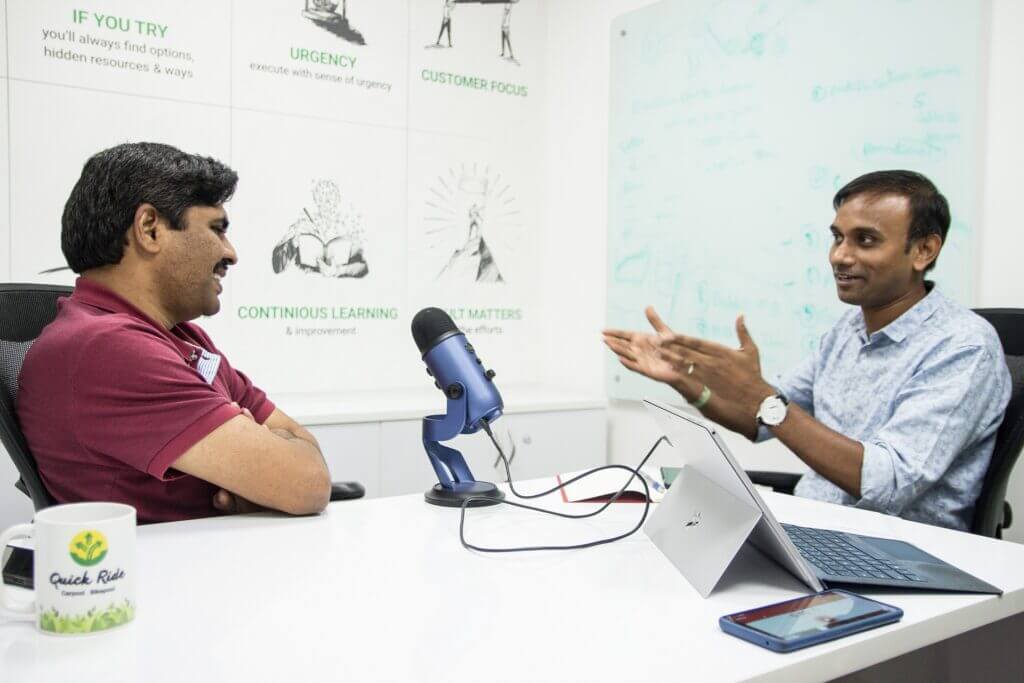
Farming to Tech Entrepreneurship and putting a dent in India’s Urban mobility problem
The world of entrepreneurs is full of people who saw a problem and decided to do something about it. And then there is the world of entrepreneurs who think of doing something but keep thinking. It easy to fall into the trap of wanting to do something and yet not doing it. But what if it had already been tried by a few and a few times but they had all failed? Listen to KNM Rao of Quick Ride talk about going from Farming to Tech Entrepreneurship and putting a dent in India’s urban mobility problem.
It takes unique ability and unique insight to attempt solving the same problem attempted by a few. After all, the world of startups is full of failures. 98% of startups fail and it is said that most of them fail because there was no market need that was felt. Barring the obvious ones that fall into this bucket, how would you know?
You would know by the intensity with which the problem keeps coming at you. And the unique insight that you have developed about that problem. So much so that it refuses to let go of you or you refuse to let go of that. That is the unique insight that KNM Rao had about Quick Ride. Although a techie by profession, everything about KNM Rao and Quick Ride stands in stark contrast with what we usually associate startups albeit scaled up startups with.
From being a farmer and stumbling onto programming by accident, KNM Rao’s tryst with entrepreneurship is full of interesting twists and turns. This is his story. Give it a listen and let us know your take! By the way, DON’T MISS – We have included a Bonus section at the end of the Episode summarizing many key insights about Quick Ride.
Here are a few key excerpts that you can find in the episode
K N M Rao 1:35
Yeah, so Quick Ride we started with a vision basically to remove the vehicles from the road and to help the tier 1 cities to combat with the traffic congestion and growing pollution. And we started in 2014. Last five years, we have grown to scale that way we are able to do almost 100,000 carpools every day. And so we are a team of close to 200 people now and working across all the metro cities.
Krishna Jonnakadla 3:10
That’s wonderful. So let’s go back to the beginning a little. Carpooling is not a new idea. While in scale, it’s an idea that can impact a lot of people. And also take off the severe stress that our urban infrastructure is in across the country.
What was that moment where you felt personally? Because there have been, like you said, there are carpooling startup, there are companies that are enabling this. How did you rationalize that you could do a better job? And what was that emotional point that caused a trigger that force you to start? Yeah.
Thought Behind Quick Ride
K N M Rao 3:45
So in 2013, I was working in Huawei as a Director, so I have a team and many of my team members I used to see them waiting and the reception for office cab. And they used to wait for a long time. And I also know a couple of them come from the same area.
Then I thought that I wanted to offer, but there is always a hesitation and they also know that I go to the same location, but there is a hesitation. So, I thought there should be a dynamic way instant way to connect the people and where people are going, and they can share the commute.
We also used to face parking issue and there was limited parking, so to get a more convenient parking, we used to race to go to the office early so that we can get a convenient parking which is close to, I mean, where we are working.
Otherwise they used to provide a standard parking somewhere and I used to watch a lot of single driven cars along with me including me at the signal, then the thought came that there should be a way to connect the people and these people have different timings then you should work on different days. So it should work instantly.
Rao’s Humble Background
K N M Rao 8:39
So I come from a farmer family, I used to, I studied most of the time in government schools, and 10 standard and even intermediate in the villages, mostly in the villages. And we used to work in the fields in the morning and evening and only during the time used to go for the College or School. So for the College I was studying, actually we never expected that we will come out of the intermediates we thought that we will close the intermediate will fail intermediate and we will continue in the farming.

Krishna Jonnakadla 12:26
Okay so 16 years is not an easy thing to shake off and say okay, tomorrow I’m going to be in the wild on by my own Yeah. Did any of the farming roots because when you’re in the farm, you’re close to nature. I’ve seen a lot of people talk about how gardening tells you a lot about life right because you sow hundred seeds and not all the hundred grow.
Yeah, and about 20 grow initially and eventually in the 20 some again die some that you don’t expect to grow actually end up growing. But it also teaches you patience. So did any of your farming roots have anything to do with any of the jump that you took?

Risk Appetite
K N M Rao 13:09
Yeah, I think it has given me required risk appetite. If you look at it many times when I was farming also we used to farm very carefully from the beginning and when it was about to get the yield we used to get the cyclones, floods and used to lose all that but at the same time still with the fresh energy we used to s start next year again, right with a lot more hard work lot more hope we got a nice to start.
I think that is the risk appetite. And then we really see the youth coming and we also feel we cherish that success, whether we got the best yield out of the whole village or not we used to compete lacking on it. So I think that has given it required a risk appetite and also to work hard and be persistent. Got it.
K N M Rao 16:53
Okay. So we didn’t follow the MVP model.
Trust Factor!
K N M Rao 23:59
Yeah. Whenever we ask anyone to do carpooling, the first question is the trust, the first question is still that trust and there are a lot of assumptions also.
Krishna Jonnakadla 25:40
Some of these things can work at scale. Yeah, so once you have say 5000 riders and 5000 rides, then these things are ratings, but now the initial, let’s say the zero to 500 or zero to thousand. Yeah, that journey must have looked very different. How was that?
K N M Rao 34:13
I think the reason we came so far is also because of the user’s.
K N M Rao 52:27
It took some time for people to understand. See, people always say that carpooling is good, but it’s not for me. My timings are different, my route is different.
Show Notes
Follow Quick Ride @quickridein
Learn More about Quick Ride
Here is a word cloud with some interesting words used through the episode

If you liked the conversation of KNM Rao on Maharajas of Scale do subscribe to us
Follow Maharajas of Scale on Twitter (@maharajaofscale)
